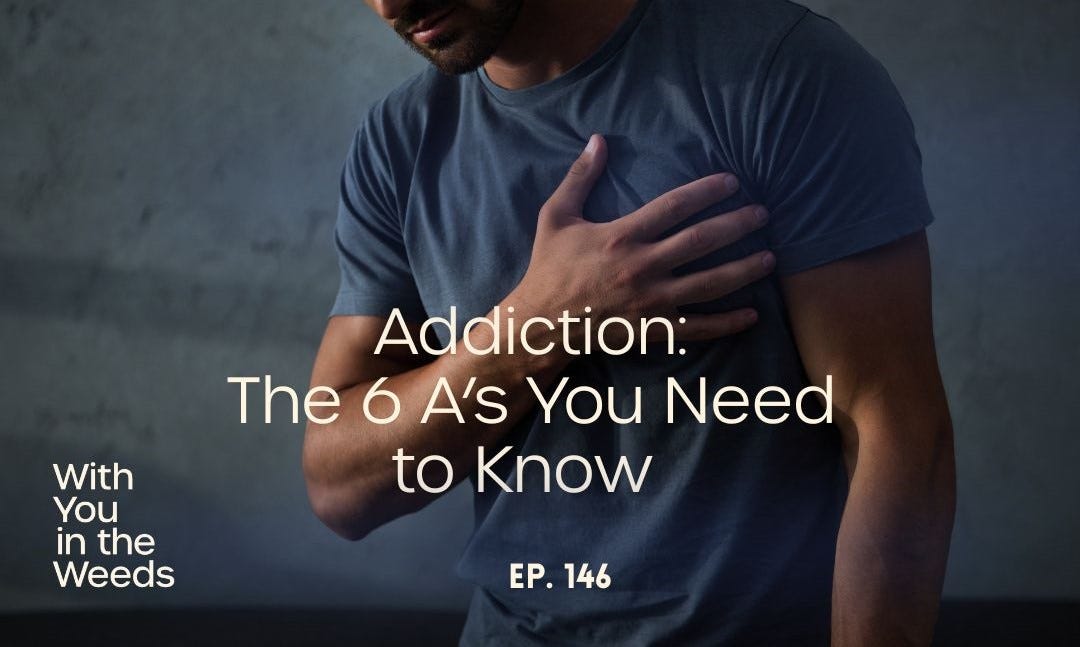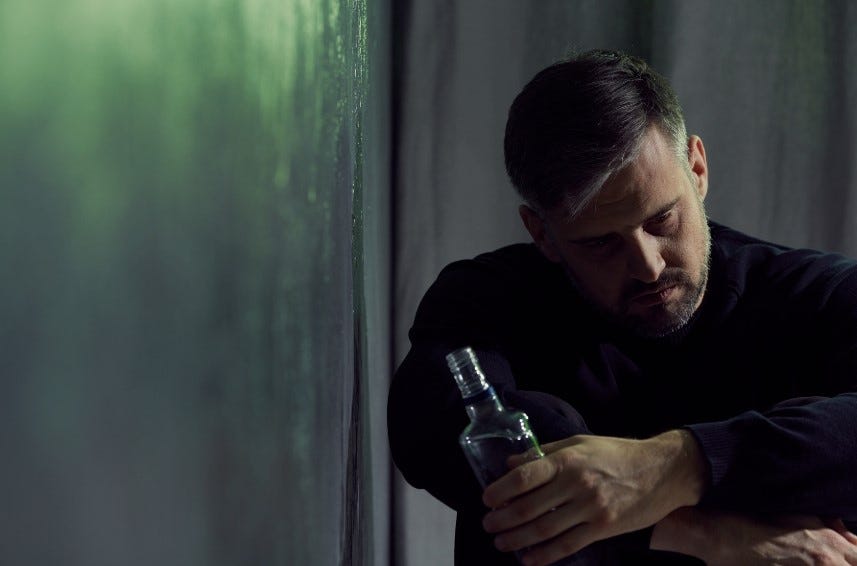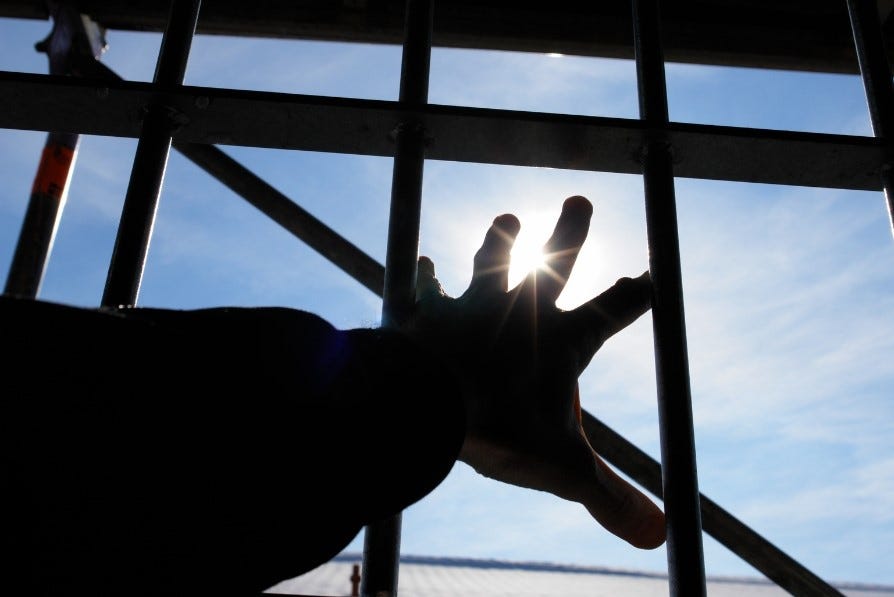Addiction: The 6 A’s You Need to Know
Can addiction bring you closer to God?
Do you ever find yourself turning to destructive behaviors to soothe the ache inside you? Does trying to quit these habits leave you with feelings of frustration and even despair? If so, we’d like to offer you some hope.
In this introductory episode of our new series, Dealing With Your Addictions, John and Lynn talk about addictions openly and honestly, without shame or judgment. Their goal is to help you understand what addiction is, why it is such an easy trap to fall into, and how God wants to heal you and give you hope and a future.
This compassionate episode will cover these key points:
What addiction is and why it affects everyone
An overview of our new addiction series
The 6 A’s of addiction – all the hows and whys
Takeaways to bring hope if you struggle with addiction
You’ll want to listen in as John and Lynn share the surprising truth that addiction is not an unforgivable sin but can actually pave the way for you to accept God’s love, grace, and forgiveness.
What Is Addiction?
As we begin to talk about addiction, you might be tempted to tune out if you have a certain image in your mind of what ‘addiction’ is. You may picture someone who has hit rock-bottom because of an addiction and if you don’t see yourself that way, you may conclude that you don’t have an addiction. Or you may feel that using the word ‘addiction’ is unbiblical because that word isn’t found in the Bible.
In this series, ‘addiction’ is a shorthand term that we're using to describe a broad dynamic. The way we are using it, addiction exists in everyone's life to some degree. It’s our umbrella term to cover a lot of components and elements. If it helps, you don't have to use the word ‘addiction’ as you apply this material to your life. You can simply examine your relationship with a substance or behavior.
According to physician and author Gabor Maté, addiction has 3 key elements:
A compulsive behavior or substance that a person uses repeatedly
Continued use even when the behavior or substance brings negative consequences
An increase in the behavior or substance is needed in order to gain a benefit
The word ‘compulsive’ works really well here; it’s the idea that you're so obsessed with thinking about it that you're compelled to use it or engage in it. One of the key things when you're coming out of an addictive cycle is to ask yourself, How often do I think about this?
Why Should You Care About Addiction?
We design our podcast series around questions we get from our clients on a regular basis—and addiction is no different. Sometimes the only place people open up about their struggles is in therapy, because they aren’t comfortable sharing with their friends and family or small group. Even if you don’t struggle with addiction, you may know or love someone that does. So it’s a far-reaching issue that impacts everyone.
Today, we're going to learn the 6 A’s of addiction that are going to help you understand this topic better. As our series continues, we’ll look at a biblical and spiritual analysis of addiction, how it affects the brain, and get specific about substance addictions like alcohol, marijuana, pornography, sex, screen addiction. and social media.
We’ll also address process addictions (behaviors) like shopping, workaholism, disordered eating, and gambling. If you hang in until the end, we’ll cover what it takes to break the chains of addiction. The last episode in this series will address the universal addiction that we all have, but you’ll have to wait to find out what that is!
Foundational Truths About Addiction
There are two foundational truths about addiction. First, addiction is a gift. You may wonder what we mean by that! How can addiction be a gift? We’ll explain that in a second. Second, addiction is not the unforgiveable sin, nor does it make you subhuman.
To explain further, addiction is a gift because if you listen to it, it will lead you into very deep places of your heart that need to be loved, fortified, healed, and given the life of God and good things from creation. It’s an entryway for you to acknowledge the reality of feelings of emptiness or shame or loneliness and invite the life of God into those broken parts of your heart.
The dichotomy of pain is that if you pay attention to it and work with it, it can be helpful, but if you leave it alone, it can be insufferable—which is why you try to escape it.
The dichotomy of pain is that if you pay attention to it and work with it, it can be helpful, but if you leave it alone, it can be insufferable—which is why you try to escape it.
Addiction itself is not the problem, but a lot of people approach it that way. That's what AA calls being a ‘dry drunk’. Many people believe, “If I just stop drinking, then my life will be calm, and my problems will be over.” But there's so much more to it than that. Addiction is an attempted solution to solve a deeper problem.
Addiction is also not an unforgiveable sin. It’s important for us to state that upfront because a lot of our audience are faith-based church attenders. We're in a local church that sponsors our podcast. But churches can be one of the most difficult places on earth to admit an addiction. Legalism will make you feel like a hopeless failure if you struggle with addiction.
As one pastor put it, “I have to look good and act good to be good.”
The deepest problem that you have is at your core, where you long to know the answer to questions like, “Am I enough? Do I have what it takes? Can I measure up?” We're all born with this kind of longing and incompleteness.
The 6 A’s of Addiction
These 6 points will help you understand the main issues that produce and maintain addition as well as the way it progresses over time:
Avoidance: People use substances or behaviors to avoid painful emotions or realities, like shame, emptiness, loneliness or guilt. Addictions help you avoid thinking about and processing your history, your story, your pain, where sin has broken you or the enemy has lied to you. You want to avoid the reality of your painful emotions and regretful decisions and you’re looking for an escape.
As one person put it, “It's not that you want to feel something, it's that you don't want to feel other things.” A good way to pinpoint this issue is to ask yourself, “In what areas of my life am I trying to avoid feeling something? What would I want God to not ask me about?”
Affect Regulation: Regulating your affect is how you handle emotional experiences and then respond to those emotions appropriately. Sometimes when you have intense emotions, you’re able to cope with them without being overwhelmed. But when you feel overwhelmed by intense emotions, you’ll look for the quickest way to make those feelings go away and calm yourself down.
When you're distressed or upset, you're vulnerable to looking for a substance or behavior to change your emotional state because the quickest way to change your mood or your emotional state is a chemical change in your brain. When you rely on things like sex, food, shopping, sports, video games, pornography, alcohol, and binge-watching to be able to function, you’re moving towards addiction.
Attachment: If you ask most psychologists the core issue that drives all kinds of behaviors—including addiction—they’ll most likely mention attachment. God wired us for relational connection. Every child needs the 4 S’s: being seen, soothed, safe, and secure. If those needs are not met in infancy or early childhood, you may find yourself relying on substance or process addiction as a way to self-soothe.
But more than that, if you experience trauma in childhood, you’ll be primed to seek safety and security in addiction as a way to survive the suffering. John Michael Cusick talks about being abused as a child and finding himself caught in the throes of addiction as an adult. A turning point was when he imagined that Jesus was beside him, putting his arm around him, saying, "Of course you've done these things. Look at what you've gone through. Now let's do some things differently."
Abuse: When the addictive substance or behavior brings negative consequences, but you are unable to quit or step away, you are trapped in abuse. The pleasure circuits in your brain adjust to certain levels of stimulation and need more and more of that substance or activity to produce the feeling of relief, happiness, or comfort. When this point of diminishing rewards is reached, the addiction will consume you—even if you want out.
Adverse Consequences: You will experience the negative impact of addiction on relationships, health, work or finances as the adverse consequences of addiction play out. There will be increased conflict in relationships, especially marriage, including arguments about the process or the substance you're engaging in, waking up not knowing what you've said the night before, and feelings of guilt and anxiety.
Continued use of the substance or the process leads to negative outcomes. Fatigue. Weight gain. Financial issues. Loneliness and depression. Disconnection. You might start to hide the consequences of your addiction—or be in denial about how bad it is. The deception starts subtly, but then becomes more pronounced. At some point you might realize you have a problem, but you can’t break away from it.
Addict Brain: Many classic defense mechanisms come into play in the addict brain, such as rationalization, entitlement, justification, denial and an unwillingness to take responsibility for your actions. Your brain is justifying your need to continue to use the substance or engage in the behavior and now you’re lying and hiding. You think that you're in charge of your life when really your addiction is in charge of you.
There's actual neurological conditioning that occurs over time. And although we classically think of this coming from a chemical substance addiction like alcohol or drugs, research is showing that consuming short videos and habitually engaging in social media content in short form like quick videos, reels, TikToks, wires your brain to crave constant stimulation.
Where Do You Go From Here?
There are 3 things we want you to take away from this episode:
First, we want you to feel free in a non-judgmental, non-shaming way to be curious about what things in your life serve the function of avoiding the deepest ache of your heart, which is to be known and loved, to be accepted, to be safe, to be secure, to be to be noticed, to be seen. There's a freedom to be found here but it is a long journey. It's a journey that keeps your head looking upward toward the sun instead of downward into a hole.
Second, if you find yourself resonating with this material today or any of the future episodes on addiction, that awareness could be a path to a deeper relationship with God and a healthier life. It’s a gift to realize you are at a point of total powerlessness. That's an entry point to God's grace, to God's love, and to fully comprehending the totality of the gospel in your life.
Third, we want you to realize that you are “more normal” than you think. In Romans 7, Paul says, "I don't do what I want to do, and I do what I don't want to do, and it's not me doing it. It's sin in me.” He can't will his way out of this. He’s overpowered. And that is the place you may find yourself—deep in the weeds. Instead of trying to pull your own weeds, invite Jesus to do it.
We’ll end with another piece of wisdom from Michael John Cusick: "If you find yourself failing in these areas, remember that God does not have expectations of you. You've not failed his expectations if you struggle with addiction. Instead, God has expectancy of what you can become.” God wants to do something deep in your heart, and as you listen to this series, we want you to be open to what that is.




